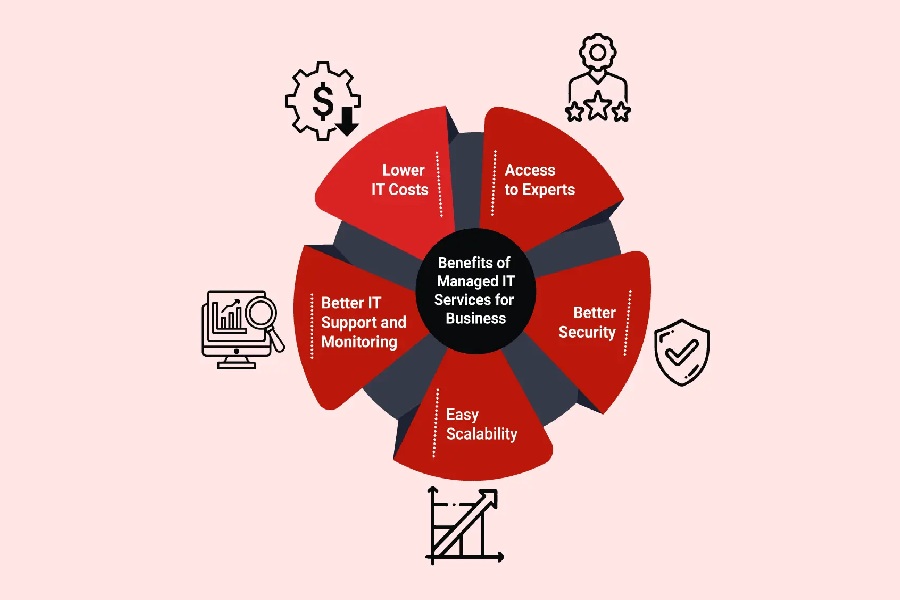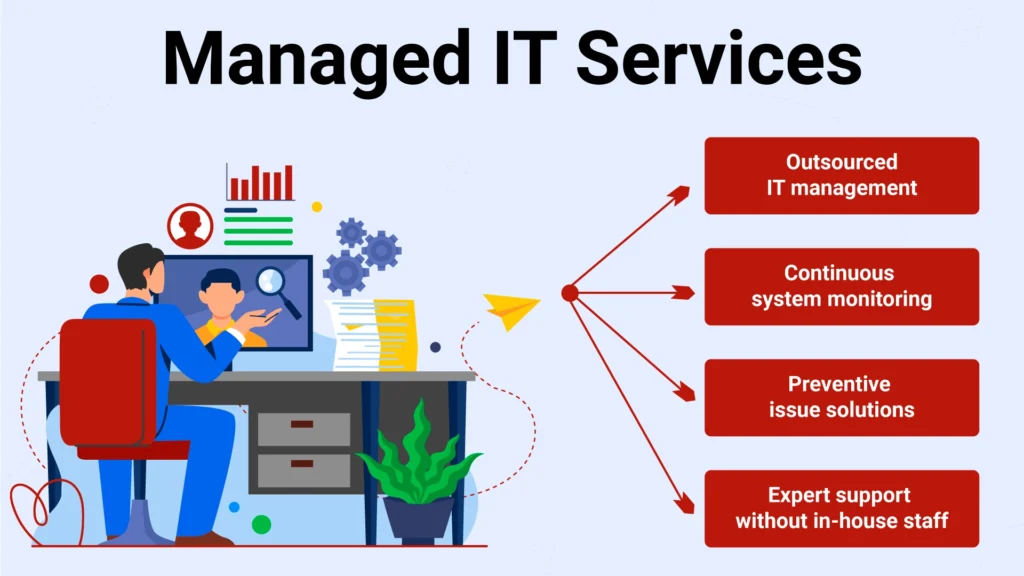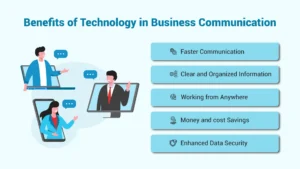The benefits of managed IT services are crucial in today’s technology-driven world. So, businesses need to keep up with ever-evolving IT demands while ensuring that their operations run smoothly and securely. However, managing IT systems in-house can be a daunting and costly task, especially for companies without a dedicated IT team. This is where Managed IT Services step in, offering businesses an efficient and cost-effective way to handle their IT needs without the overhead and stress.
In this comprehensive guide, we’ll dive into the benefits of Managed IT Services and how they can help your business grow, save money, and improve overall efficiency. We’ll also explore different types of managed services, compare them with shared IT services, and provide expert tips for choosing the right provider. By the end of this article, you’ll understand why Managed IT Services might just be the solution your business has been looking for.
What are Managed IT Services?
Definition of Managed IT Services:
Managed IT Services refer to the practice of outsourcing a company’s IT management and support to a third-party provider known as a Managed Service Provider (MSP). Instead of hiring and maintaining an in-house IT team, businesses partner with an MSP that oversees and manages their IT infrastructure, systems, and operations.
MSPs provide proactive support, meaning they monitor your systems 24/7, identify potential issues, and resolve them before they cause disruptions. This proactive approach helps businesses avoid costly downtime and allows them to focus on their core activities. With Managed IT Services, companies receive a range of services that can be tailored to meet their specific needs, from cybersecurity to cloud management, all for a predictable monthly fee.
Key Features of Managed IT Services:
- Proactive Monitoring and Maintenance: MSPs continuously monitor your systems and perform regular maintenance to ensure smooth operation.
- Data Backup and Recovery: MSPs manage secure data backup services, ensuring that important business data is retrievable in case of an emergency.
- Cybersecurity Protection: Services include protection against malware, ransomware, and other cyber threats.
- Support and Help Desk Services: 24/7 support ensures that businesses can get help whenever they need it.
- IT Strategy Consulting: Many MSPs also offer consulting services to align your IT infrastructure with your business goals.
Managed IT Services provide businesses with the IT support they need without the headache of managing it themselves. By leveraging an MSP, companies can take advantage of industry expertise, specialized knowledge, and cutting-edge technology without breaking the bank.
Types of Managed IT Services
Managed IT Services are not one-size-fits-all. Different businesses have varying IT needs, and Managed Service Providers offer a wide range of types of IT management services. Depending on your business’s size, industry, and specific challenges, you can opt for one or a combination of Managed IT Service types. Below are some of the most common services offered by MSPs:
1. Network and Infrastructure Management
This involves the management of your network, including routers, switches, servers, and other hardware. MSPs ensure that your network remains functional, secure, and up to date with the latest technologies. This also includes network performance monitoring, patch management, and troubleshooting.
2. Cybersecurity Services
Given the increasing threats from cybercriminals, cybersecurity is a top priority for businesses. MSPs offer services such as firewall management, intrusion detection, vulnerability scanning, and real-time threat monitoring to safeguard your data and systems from hackers and other malicious actors.
3. Cloud Management
With the rise of cloud computing, many businesses have transitioned to cloud-based systems. Managed Cloud Services help manage cloud platforms, ensuring secure and efficient use of cloud resources. Services often include cloud hosting, virtual desktops, software as a service (SaaS) management, and cloud storage solutions.
4. Data Backup and Disaster Recovery
MSPs provide robust data backup services that ensure your business-critical data is regularly backed up and can be quickly restored in case of a system failure or data breach. This service ensures that your company can resume operations with minimal downtime, even after a disaster.
5. Help Desk Services
Managed help desk services offer technical support for end-users, resolving issues related to hardware, software, and network performance. Many MSPs provide 24/7 support, ensuring your team gets the assistance they need anytime.
6. Managed Communication Services
This includes unified communications solutions like VoIP (Voice over Internet Protocol), video conferencing, and messaging systems. MSPs manage these communication tools to ensure seamless connectivity, whether your team is in the office or working remotely.
7. Compliance Management
For businesses operating in highly regulated industries (like healthcare, finance, or government), adhering to industry-specific compliance standards is crucial. MSPs help ensure that your IT systems meet these standards, including HIPAA, GDPR, and PCI-DSS, among others.
8. IT Consulting Services
MSPs often provide consulting services, helping businesses develop IT strategies aligned with their long-term goals. This can include technology roadmaps, system upgrades, and digital transformation plans.
By understanding the various types of IT management services available, you can choose the ones that align best with your business needs. Some businesses may need only network management, while others might require comprehensive services that include security, cloud management, and disaster recovery.
Managed IT Services vs. Shared IT Services
As businesses weigh their options for IT support, many wonder about the differences between Managed IT Services vs. Shared IT Services. While both provide IT solutions, they do so in different ways, and understanding these distinctions can help you make an informed decision.
Managed IT Services
Managed IT Services provide proactive, full-service IT management. Your business partners with an MSP that takes responsibility for monitoring and maintaining your IT systems around the clock. The MSP works as an extension of your team, ensuring your technology infrastructure is running smoothly, secure, and up to date.
Shared IT Services
Shared IT Services, on the other hand, follow a more reactive model. Rather than providing ongoing monitoring and management, shared services typically offer support only when an issue arises. This means you may only call upon shared IT services when something goes wrong, and you pay on an as-needed basis.
Key Differences Between Managed and Shared IT Services
- Proactive vs. Reactive Support: Managed IT Services are proactive, constantly monitoring your systems to prevent issues, while shared IT services tend to be reactive, addressing problems as they come up.
- Cost Structure: Managed IT Services typically charge a flat monthly fee, which makes IT costs predictable. Shared services often charge on a per-incident or hourly basis, which can lead to fluctuating and unpredictable expenses.
- Level of Service: Managed IT Services offer comprehensive support, including security management, disaster recovery, and 24/7 help desk services. Shared services may not offer the same depth or scope of support.
- Business Impact: Managed IT Services can help prevent costly downtime and ensure business continuity, while shared IT services may not be as effective in maintaining long-term operational stability.
Choosing between Managed IT vs Shared IT services comes down to your business’s specific needs. If you require continuous monitoring, proactive problem-solving, and high security, Managed IT Services are a better fit. Shared IT Services may work for smaller businesses with fewer IT demands or those that prefer a pay-as-you-go model.
13 Benefits of Managed IT Services for Growth
So, why should you choose Managed IT Services over other IT management models? The benefits of managed IT services are vast and can have a significant impact on your business’s efficiency, security, and bottom line. Here, we outline the 13 benefits of Managed IT Services and how they can help your company grow.
1. Cost Efficiency
Hiring, training, and maintaining an in-house IT team is expensive, not to mention the costs associated with purchasing equipment and software. One of the most appealing benefits of Managed IT Services is cost efficiency. With a flat monthly fee, MSPs help you control your IT expenses and provide predictable costs, eliminating surprises and allowing you to budget more accurately.
2. Access to Expertise
MSPs employ a team of IT professionals with specialized knowledge in areas like cybersecurity, cloud computing, and networking. This means your business gains access to a wide array of technical expertise without having to hire or train your own team. This access to highly skilled professionals is a game-changer for small and medium-sized businesses that cannot afford to employ a full in-house IT team.
3. 24/7 IT Support and Monitoring
Downtime can have severe consequences for your business, leading to lost revenue and damaged reputation. Managed IT Services provide around-the-clock monitoring and support, ensuring issues are addressed before they escalate into significant problems. MSPs use advanced tools to monitor systems for any unusual activity, allowing them to resolve problems quickly, often before you’re even aware of them.
4. Improved Cybersecurity
In today’s digital age, businesses face a constant barrage of cyber threats, from ransomware to phishing attacks. MSPs offer advanced cybersecurity solutions, including firewall management, encryption, and threat detection systems. They also regularly update security patches and monitor your network for vulnerabilities, ensuring that your business is protected from cybercriminals.
5. Scalability
As your business grows, your IT infrastructure must grow with it. One of the key managed IT services advantages is scalability. Whether you’re expanding your team, launching new services, or entering new markets, MSPs can easily scale your IT systems to meet your evolving needs. This flexibility helps you avoid the growing pains often associated with business expansion.
6. Proactive Problem Prevention
Managed IT Services take a proactive approach to IT management. Instead of waiting for something to go wrong, MSPs perform regular system updates, backups, and maintenance to prevent potential issues. This approach reduces the risk of downtime and ensures that your systems are running at optimal efficiency at all times.
7. Regulatory Compliance
In industries such as healthcare, finance, and legal services, regulatory compliance is a major concern. Failing to comply with industry regulations can result in hefty fines and legal action. MSPs help ensure that your IT systems meet all relevant compliance standards, including data privacy laws like GDPR and HIPAA. This takes the burden off your internal team and keeps you on the right side of the law.
8. Access to the Latest Technology
Technology is constantly evolving, and it can be difficult to keep up with the latest tools and innovations. MSPs stay on top of the latest developments in technology and ensure that your business is always using the most efficient and up-to-date solutions. This not only improves operational efficiency but also gives you a competitive edge.
9. Business Continuity and Disaster Recovery
Data loss can cripple a business. MSPs offer robust data backup and disaster recovery solutions that protect your critical information and ensure that it can be restored quickly in the event of a disaster. Whether it’s a cyberattack, natural disaster, or human error, Managed IT Services help ensure business continuity by keeping your data safe and secure.
10. Predictable IT Costs
With a flat-rate pricing model, Managed IT Services offer predictable IT costs, allowing you to plan your IT budget more effectively. This helps you avoid unexpected expenses related to system breakdowns, cybersecurity incidents, or hardware malfunctions.
11. Vendor Management
Managing multiple vendors for hardware, software, and services can be time-consuming and overwhelming. MSPs act as the single point of contact for all your IT-related vendors, ensuring seamless communication and quick resolution of issues. This simplifies vendor relationships and ensures that you’re always getting the best deals and support from your technology partners.
12. Increased Efficiency and Productivity
When your IT systems run smoothly, your team can focus on their work without being bogged down by technical issues. MSPs optimize your IT environment, ensuring that everything from your network to your software applications is functioning at peak performance. This increased efficiency results in better productivity and, ultimately, a positive impact on your bottom line.
13. Competitive Advantage
By leveraging Managed IT Services, your business can stay ahead of the curve in terms of technology, security, and efficiency. This gives you a significant competitive advantage over competitors who may not have access to the same level of IT expertise and support. With the right MSP by your side, your business can innovate faster, adapt to changes more easily, and provide a better experience to customers.
Who Needs a Managed Service Provider (MSP)?
Now that we’ve explored the benefits of Managed IT Services, the next question is: Who needs MSP services? While every business can benefit from an MSP, certain types of organizations stand to gain the most.
Small and Medium-Sized Businesses (SMBs)
For many small and medium-sized businesses, maintaining a full-time IT department is cost-prohibitive. MSPs provide these businesses with the same level of IT support and expertise that larger companies enjoy, but at a fraction of the cost. This allows SMBs to remain competitive without the overhead of an in-house IT team
Startups
Startups need to be nimble and resourceful. Rather than dedicating a portion of their limited budget to hiring an IT team, startups can use an MSP to handle their technology needs. This allows them to focus on developing their product or service and scaling their business without worrying about IT issues.
Companies With Remote or Distributed Workforces
With remote work becoming the new norm, businesses need to ensure their teams are equipped with secure and reliable technology. MSPs help manage the IT infrastructure that supports remote work, including cloud services, virtual private networks (VPNs), and collaboration tools.
Highly Regulated Industries
Companies in regulated industries like healthcare, finance, and legal services face stringent data privacy and security requirements. MSPs can help these businesses comply with industry regulations while ensuring that their systems are secure and up to date.
Growing Businesses
As businesses grow, so do their IT needs. MSPs offer scalable solutions that allow companies to expand their IT infrastructure without the headaches of managing it in-house. This makes it easier for growing businesses to focus on expansion without being held back by outdated or inadequate technology.
Why Your Business Should Consider Managed IT Services
There are several reasons to use managed IT services, especially in today’s rapidly changing business landscape. As companies become more reliant on technology to drive growth, the need for reliable, secure, and efficient IT management becomes even more critical. Here’s why you should consider Managed IT Services for your business:
1. IT Complexity is Increasing
As technology becomes more sophisticated, the complexity of managing IT systems also increases. For businesses without an experienced IT team, this can be overwhelming. MSPs take the burden off your shoulders by managing everything from network security to cloud services, ensuring your systems are running efficiently and securely.
2. Cybersecurity Threats are on the Rise
Cyberattacks are becoming more frequent and more sophisticated. With Managed IT Services, you get top-notch cybersecurity solutions that protect your business from evolving threats. MSPs provide proactive monitoring, regular updates, and fast response times to minimize your risk of a data breach or other security incident.
3. Reduced IT Downtime
Unexpected IT issues can lead to significant downtime, which costs your business money and productivity. MSPs work around the clock to monitor and maintain your systems, preventing problems before they arise and ensuring that your business stays up and running.
4. Focus on Core Business Activities
Managing IT infrastructure can be time-consuming and distract from your core business activities. By outsourcing your IT management to an MSP, your internal team can focus on strategic initiatives and growth, rather than spending time troubleshooting technical issues.
5. Cost Control and Predictability
For many businesses, in-house IT can lead to unpredictable costs. Managed IT Services offer a flat-rate pricing model, giving you better control over your IT budget and avoiding unexpected expenses related to system failures or cybersecurity incidents.
Ultimately, why choose Managed IT Services? The answer is simple: they provide the peace of mind, expertise, and efficiency that businesses need to stay competitive in an increasingly digital world.
Expert Tips for Choosing the Right Managed IT Provider
Choosing the right MSP is critical to your business’s success. Not all MSPs are created equal, so it’s important to do your homework before signing a contract. Here are some expert tips for choosing the right Managed IT Provider:
1. Evaluate Their Experience and Track Record
When selecting an MSP, it’s important to evaluate their experience in the industry and their track record with other clients. Look for an MSP with experience in your specific industry, as they will have a better understanding of the challenges you face and the regulations you must comply with.
2. Look for 24/7 Support
Make sure the MSP you choose offers round-the-clock support. IT issues can happen at any time, and you need to be confident that your provider will be available to resolve them quickly, even outside of regular business hours.
3. Ask About Their Security Protocols
Security is a top priority for any business, and your MSP should be able to demonstrate strong cybersecurity protocols. Ask about their approach to security, including encryption, firewalls, intrusion detection, and regular updates.
4. Understand Their Scalability
Your business’s IT needs will likely change over time, so it’s important to choose an MSP that can scale with you. Make sure they offer scalable solutions that can grow with your business, whether you’re adding new employees, expanding into new markets, or launching new services.
5. Check Client References and Reviews
Don’t just take the MSP’s word for it—ask for references and check online reviews. Talk to other businesses that have worked with the MSP to get an idea of their reliability, customer service, and the overall quality of their services.
Wrapping Up
The benefits of Managed IT Services are clear: they provide businesses with a cost-effective, scalable, and secure way to manage their IT infrastructure. Whether you’re a small startup or a large enterprise, partnering with an MSP can free up your internal team to focus on growth and innovation, while ensuring your technology is always up-to-date and running smoothly.
By leveraging the expertise of a Managed Service Provider, businesses can enhance cybersecurity, reduce downtime, and ensure compliance with industry regulations. With predictable monthly costs, MSPs make it easier for businesses to control their IT budgets while gaining access to cutting-edge technology and expert support.
As technology continues to evolve, businesses that invest in Managed IT Services will be better equipped to adapt to change, respond to cybersecurity threats, and ultimately, stay ahead of the competition.
If your business is struggling to manage its IT needs or looking for ways to improve operational efficiency, it’s time to consider the advantages of Managed IT Services. Whether you’re looking to reduce costs, enhance security, or scale your operations, an MSP can provide the support you need to thrive in today’s digital landscape.
Author
-

Jay S. Allen, MCP, MCSA, MCSE, MCSE+ Security, is an experienced IT professional with more than 20 years in the industry. He specializes in delivering enterprise-level cybersecurity and IT support solutions tailored to small and mid-sized businesses. Through Techno Advantage, Jay is dedicated to helping organizations strengthen their security posture and achieve greater efficiency through smart, scalable technology solutions.













